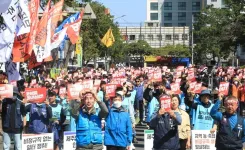Is Bangladesh Facing Its Worst Crisis Yet Under Yunus's Leadership?

Synopsis
Key Takeaways
- Bangladesh is in its deepest crisis in over a decade.
- Islamist militancy and extremism are on the rise.
- Economic collapse is evident, with GDP growth drastically reduced.
- Violence against women has surged alarmingly.
- Urgent electoral reform is necessary for stability.
Dhaka, Sep 2 (NationPress) Bangladesh is undergoing its most critical turmoil in over ten years, attributed to Islamist militancy, extremism, economic disintegration, soaring unemployment, a breakdown in law enforcement, and widespread unrest under the interim administration of Muhammad Yunus, the Awami League reported on Tuesday.
In a document titled ‘Bangladesh’s Crisis Deepens in 2025: A Nation in Decline’, the party claimed that “the military-supported interim government” that succeeded former Prime Minister Sheikh Hasina in 2024 has failed to stabilize the nation, resulting in a decline in the economy, security, and democracy.
Pointing out the escalating Islamist militancy and extremism in Bangladesh, the Awami League highlighted that at least 15 Islamist attacks have been documented since October 2024. According to intelligence reports, the recruitment of youth into extremist factions is rising, with thousands being radicalized through online platforms.
The report indicated that at least 40 incidents of violence against minorities, driven by extremists, occurred in the first half of 2025 across the nation, many of which involved physical violence or intimidation. Furthermore, assaults on minorities have doubled, with Hindu temples and Christian establishments frequently vandalized.
The Awami League noted that Bangladeshi authorities often fail to intervene, with investigations either slow or nonexistent, and prosecutions remaining rare, allowing extremists to operate with near impunity.
“Under the leadership of the Yunus administration, Bangladesh has seen a concerning rise in violence against women, revealing a systemic failure in law enforcement and social protections. In just the first six months of 2025, official records indicate over 4,200 instances of rape and sexual assault, including at least 650 cases of gang rape, a significant increase from 3,100 cases during the same timeframe in 2024. These statistics likely underestimate the severity, as many survivors choose not to report due to fears of retaliation or disbelief in authorities,” stated the report.
The Awami League asserted that the economic downturn under the Yunus regime is not merely a slowdown; it represents a systemic breakdown, affecting livelihoods, social stability, and the very foundations of Bangladesh’s future.
“GDP growth has nosedived from 6.1 percent in 2023 to a mere 2.3 percent in 2025. Inflation currently exceeds 12 percent, with food inflation soaring to 16 percent, hitting the most vulnerable hardest. Foreign reserves have plummeted from $33 billion in 2022 to $14.5 billion by July 2025, raising alarms about a potential balance-of-payments crisis,” the report elaborated on the economic disaster in Bangladesh.
“Youth unemployment has skyrocketed beyond 28 percent, the highest in South Asia. Remittances, a crucial support for millions, fell by 11 percent year-on-year. Over 2 million workers in the garment industry are facing layoffs due to dwindling exports,” it added.
The Awami League stressed that the only viable path to overcome Bangladesh's crisis is to facilitate free, fair, and inclusive national elections involving all significant political parties under a neutral caretaker framework.
The current interim government, it claimed, is closely linked to the National Citizens’ Party (NCP) and has demonstrated clear favoritism and political bias, rendering it incapable of conducting unbiased elections. The party cautioned that without a truly impartial framework, any electoral process would risk solidifying the current atmosphere of oppression, lawlessness, and injustice in Bangladesh.








